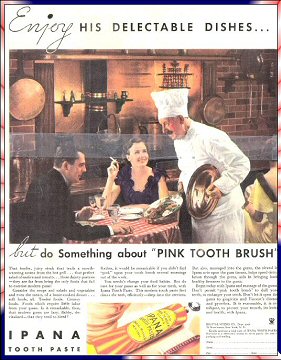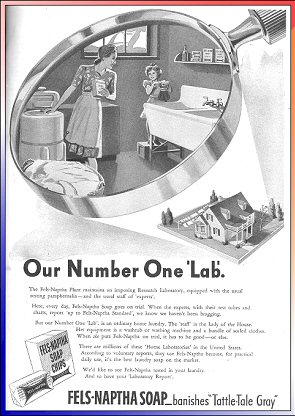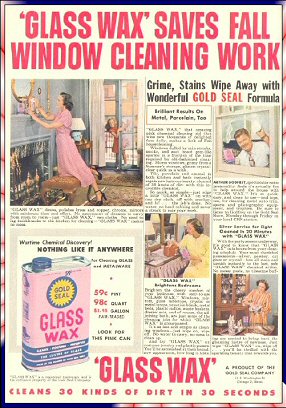Radio
Sponsor Adversaries
Tries To Share Its Misery
With Radio Listeners
“Guard
against ‘Throat Scratch!’”
Lincoln, Me. (DG)—
In other articles I have written, you noticed some products
had adversaries who tried to make life miserable for anyone who was considered a
human being. If the radio
commercials were to be believed, if someone didn’t use the product, he/she was
guaranteed to suffer the consequences the adversary happily dished out.
It was the worst of all worlds if someone had the awful combination of “B.O.”
and “Coffee Nerves.” To
avoid this double-whammy, that person should bathe with Lifebuoy Health
Soap and drink Postum instead of coffee.
You might have noticed I selected “B.O.” and “Coffee
Nerves.” Not only were these
2 adversaries famous on the radio, I have already written about them in other
articles. Since I have already done
this, you won’t be reading about them any further.
This article will focus on other famous adversaries heard over the
airwaves.
 We begin with the color pink.
As a rule, pink is a nice, cheery color.
Since it is nice and cheery, pink is a welcomed color for everything,
right? Sorry! There was
an exception where pink wasn’t a particularly pleasant sight to see.
This exception was also an adversary to take very seriously--- the
infamous “Pink Tooth Brush.” We begin with the color pink.
As a rule, pink is a nice, cheery color.
Since it is nice and cheery, pink is a welcomed color for everything,
right? Sorry! There was
an exception where pink wasn’t a particularly pleasant sight to see.
This exception was also an adversary to take very seriously--- the
infamous “Pink Tooth Brush.”

To set the record straight, Pink Tooth Brush
doesn’t mean the color of the tooth brush handle.
It referred to the pink tinge on the bristles after a person brushed
his/her teeth. If pink was present
after brushing, there was big trouble inside that person’s yap.
What that person had was tender, bleeding gums.
Unless something was done to solve this problem, that person had to hunt
for false teeth in the Sears-Roebuck Catalog
(just
kidding).
Luckily, Pink Tooth Brush was easily solved.
All it took was Ipana Tooth Paste and gentle massaging of
the gums. When the brushing and massage was completed, the teeth were a
brilliant white, and the gums had a refreshing tingle.
These were all good signs, as the teeth and gums were making a strong
comeback to health. Not only did
brushing every day with Ipana conquer Pink Tooth Brush, it
also protected the teeth and gums from other unpleasant and disgusting oral
ailments like Gingivitis, Pyorrhea, and Vincent’s Disease.
An Ipana Smile was both a beautiful smile and more
importantly, a healthy smile.
Colds and flu were 2 very annoying adversaries--- and ones
the radio sponsors didn’t necessarily conquer.
Since the only cure was to let them run their course, the best the
products could do lessen its discomforts. Despite
this “no win” situation, a large number of radio sponsors were more
than willing to do battle. On the
radio, the listeners heard Vicks
VapoRub, Hill’s Cold Tablets, Kriptin, Tabcin, Anahist, Bayer Aspirin,
and Dreft participate in the fight against colds and flu.
You should already know Dreft is a washday
detergent, but you might be wondering why I mentioned it with the other cold
relieving products. No, Dreft
didn’t exactly relieve the discomforts of colds and flu, but it did protect
healthy family members by doing what it does best--- wash dishes “Healthfully
Clean.”
During cold and flu season, Dreft aired some
sobering and shocking commercials concerning washing dishes and health.
These commercials featured a grim reality on why soap products should
not be used for washing dishes.
After washing with soap, the dishes looked clean, but were
they really clean? In
this case, appearances were very deceiving.
While the dishes looked clean to the human eye, there were breeding cold
and flu germs on the glasses, dishes, and silverware just waiting for someone to
catch them. Although soap is
associated with cleanliness, there was a health risk for every member of the
family who ate or drank from (supposedly) clean dishes.
The source of the problem was the soapy layer on the surface of the
dishwater. When the dishes were
submerged into the dishwater, they were actually free of germs for that moment.
Unfortunately, when it was time to rinse the dishes, they had to go
through that soapy layer again--- with the cold or flu germs going along for the
ride. Even vigorous rinsing of the
dishes didn’t get rid of the germs.
A possible solution to this problem was to leave the dishes
submerged in the dishwater for life. They
wouldn’t have a single germ on them, but since they were permanently
submerged, they couldn’t be used in the future!
In about 30 years, the dishwater might be a little disgusting--- but the
dishes were still free of cold and flu germs.
Not very practical, is it?
The practical solution was to wash the dishes with Dreft.
Since it wasn’t soap, Dreft didn’t have that
nasty soapy layer on top of the dishwater.
When the dishes were washed, they could be taken out of the dishwater
without any germs clinging on. In
other words, what was clean and germ free under the dishwater was also clean and
germ free out of the dishwater. Washing
dishes with Dreft helped to protect the family’s health.
If any family member was to catch a cold or flu, he/she had to do this
elsewhere. Sadly, it wasn’t very
hard to do this!
 The term “tattle tale” wasn’t exactly a very
nice name to associate with people who intentionally got a friend, acquaintance,
family member, and even adversary in trouble.
It also wasn’t a very nice name for the laundry, either. The term “tattle tale” wasn’t exactly a very
nice name to associate with people who intentionally got a friend, acquaintance,
family member, and even adversary in trouble.
It also wasn’t a very nice name for the laundry, either.
Husbands immediately knew their wives were washing the
laundry with inferior soap. How did they know? Their
(supposedly) white shirts were an awful shade of “Tattle Tale Gray.”
When this happened, husbands weren’t bashful in letting their wives
know about the error of their ways--- in a less than happy manner.
Although Tattle Tale Gray wasn’t the major reason for divorces
back then, it sure did make life miserable.
This dingy looking color was awful, but it could easily be
dealt with. Actually, there were 2
possible solutions for the wife. First
(and it’s an excellent thought), let hubby wash his own shirts.
Guaranteed, it prevented him from complaining further on this subject,
but it didn’t exactly solve the overall problem of Tattle Tale Gray.
The practical solution was to wash the laundry with Fels-Naptha.
It didn’t matter if it was the original Fels-Naptha Soap
Bar or Fels-Naptha Soap Chips--- as long as it said Fels-Naptha
on the wrapper or box. When Fels-Naptha
was used, the white clothes were actually white. That meant white shirts and happy husbands.
With Tattle Tale Gray an unpleasant, but distant memory, husbands
and wives were getting along very well, thanks to Fels-Naptha.
If “Cigarette Hangover” had an advantage
over the hangover from drinking too much, the person didn’t suffer the ill
effects the following morning. However,
Cigarette Hangover was anything but pleasant.
The cause of this unpleasant adversary was the smoking of a harsh
cigarette. Instead of giving its smokers pleasure, the harsh cigarette
was really making his/her life miserable. To begin, the taste was hot and bitter. When the smoker finished the cigarette, his/her throat was
sore and scratchy, and his/her nose was painfully sensitive.
With the exception of not smoking at all, the obvious solution of curing Cigarette
Hangover was switching to Philip Morris.  Since harshness wasn’t in Philip Morris’ vocabulary,
its smokers noticed a huge difference from the old brand they used to smoke.
Since harshness wasn’t in Philip Morris’ vocabulary,
its smokers noticed a huge difference from the old brand they used to smoke.
The makers of Pall Mall Famous Cigarettes
introduced “Throat Scratch” in its radio commercials.
It was similar to Cigarette Hangover in its effects and for making
life unpleasant. Not only was Throat
Scratch awful for cigarette smokers who suffered with it, the very name
sounded awful to every radio listener who heard about it.
Like Cigarette Hangover, Throat Scratch was self-inflicted
by smoking an inferior quality cigarette. According
to the Pall Mall radio commercials, it made a difference not only
in the quality of tobacco used, but also the cigarette’s longer length. This unbeatable combination gave its smokers pleasure, while
gradually eliminating that awful Throat Scratch.
 Just like colds and flu I mentioned earlier, dirt was an
adversary all the cleaning products heard on the radio took on and conquered.
For most people, dirt is dirt --- there aren’t different variations of
it. Guess what?
The Gold Seal Company, the makers of Glass Wax,
begs to differ. Just like colds and flu I mentioned earlier, dirt was an
adversary all the cleaning products heard on the radio took on and conquered.
For most people, dirt is dirt --- there aren’t different variations of
it. Guess what?
The Gold Seal Company, the makers of Glass Wax,
begs to differ.
According to the Glass Wax radio commercials,
there were 30 different kinds of dirt. Each
type of dirt either laid on or stuck on all surfaces around the
house. Since there were 30 kinds of dirt, Glass Wax
eliminated all of them in 30 seconds. As
Arthur Godfrey stated on his morning show, “Wipe it on!
Wipe it off!” As quick as saying that, the dirt was gone and the
surface was clean. 
Although the product said Glass Wax on the
can, it was a versatile cleaner. In addition to windows, Glass Wax cleaned away
those 30 nasty forms of dirt from mirrors, silverware, metal, porcelain, metal
lamps, and venetian blinds. You
name it--- Glass Wax cleaned it!
We conclude with an adversary women could easily do
without--- Dry, Lifeless, Middle Aged Skin.
Despite its name, this adversary did its dirty work with women of all
ages. Dry, Lifeless, Middle Aged
Skin was the result of washing the face with soap.
Although the soap was mild to the complexion, it also had an uncanny
ability to dry up the face. Instead
of a soft, smooth, and glowing complexion, it was dry, tight feeling, and rather
blah. The solution was to switch to
Palmolive Soap. Yes, Palmolive
was a brand of soap, but it was also the only soap made with olive oil.
This bland olive oil combined with a gentle soap and washed away the
dryness on the face. The result was
Palmolive’s famous “Schoolgirl Complexion Look.”
In other words, a soft, smooth, and younger looking complexion.
Women of all ages could have the same result by using Palmolive
instead of the soap they were using.
Although the product and the adversary were bitter enemies,
they both had a common goal in selling the product on the air.
The adversaries were usually defeated, but they were winners as far as
classic radio advertising was concerned. For
Pink Tooth Brush, Tattle Tale Gray, and the rest, they would
happily settle for that.
|